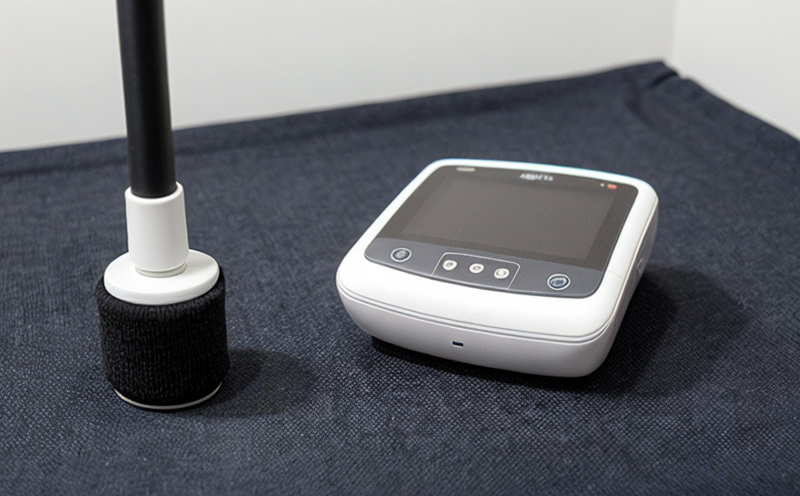ASTM E2149 Antimicrobial activity of sensor enhanced textiles
The ASTM E2149 standard provides a comprehensive framework for evaluating the antimicrobial activity of sensor-enhanced textiles. This is particularly relevant in sectors such as healthcare, personal care, and consumer goods where microbial contamination can have serious implications for public health and product performance.
ASTM E2149 focuses on the evaluation of fabrics that incorporate sensors to monitor and respond to the presence of microorganisms. These textiles are designed not only to inhibit bacterial growth but also to provide real-time monitoring, which can be crucial in environments where hygiene is paramount. The standard outlines a series of tests aimed at quantifying the antimicrobial efficacy of these materials under various conditions.
The testing process involves exposing the sensor-enhanced textiles to known microbial challenges and then measuring the change in sensor output as a function of time. This approach allows for the assessment of both static antimicrobial properties and dynamic responses, which are critical for understanding how these fabrics behave in real-world applications.
One of the key advantages of ASTM E2149 is its ability to evaluate not just the effectiveness but also the durability of sensor-enhanced textiles. This ensures that products meet long-term performance expectations, which is especially important for industries where prolonged exposure to contaminants is a concern.
The standard specifies the use of specific sensors and microorganisms for testing, ensuring consistency and comparability across different laboratories and test results. This is crucial for maintaining quality standards in the development and production of sensor-enhanced textiles.
Real-world applications of ASTM E2149 include the development of hospital gowns that can detect and respond to bacterial contamination, athletic wear that monitors sweat levels and provides a clean environment, and consumer products like bedding and towels that ensure hygienic conditions. These applications underscore the importance of rigorous testing in ensuring product safety and effectiveness.
The methodological approach described in ASTM E2149 is designed to be both accurate and reproducible, which is essential for regulatory compliance and industry best practices. The standard ensures that sensor-enhanced textiles are evaluated under controlled conditions, providing reliable data that can inform product design and development.
Scope and Methodology
| Parameter | Description |
|---|---|
| Sensor Type | Specific sensors that are capable of detecting microbial activity. |
| Microbial Challenge | Bacteria and fungi commonly found in hospital settings and consumer products. |
| Exposure Time | Duration of exposure to microbial challenge, typically ranging from 24 to 72 hours. |
| Sensor Output Measurement | Continuous monitoring of sensor output during and after the exposure period. |
| Step | Description |
|---|---|
| Sample Selection | Select samples that represent the intended use of sensor-enhanced textiles. |
| Cleaning Procedure | Ensure samples are clean and free from contaminants prior to testing. |
| Sensor Calibration | Calibrate sensors according to the manufacturer's instructions before use. |
Eurolab Advantages
EuroLab offers unparalleled expertise and advanced facilities for ASTM E2149 testing. Our team of experienced professionals ensures that every test adheres strictly to the standard, providing accurate and reliable results. With state-of-the-art equipment and a commitment to quality, EuroLab delivers consistent outcomes that meet or exceed international standards.
Our laboratories are equipped with the latest technology, allowing us to provide precise measurements of sensor output during and after microbial exposure. This ensures that our clients receive comprehensive data on the antimicrobial performance of their products. Additionally, we offer a range of supplementary services, including consultation and training, to support our clients throughout the product development process.
EuroLab's commitment to excellence extends beyond technical proficiency; it also includes a strong focus on customer satisfaction. Our team works closely with clients to understand their specific needs and provide tailored solutions that meet regulatory requirements and industry expectations. By leveraging our extensive experience and resources, we help ensure that sensor-enhanced textiles are not only effective but also safe for end-users.
Our laboratories are recognized for their rigorous quality control processes and adherence to international standards. This includes compliance with ASTM E2149 as well as other relevant guidelines such as ISO 18176-3:2015, which covers the antimicrobial properties of fabrics and textile products.
At EuroLab, we pride ourselves on delivering accurate, reliable, and consistent results. Our clients can trust that they are receiving the highest quality testing services available in the industry. With a focus on innovation and excellence, EuroLab is committed to helping our clients achieve their goals through rigorous testing and analysis.
International Acceptance and Recognition
The ASTM E2149 standard has gained widespread recognition and acceptance in the global market. It is widely used by manufacturers, researchers, and regulatory bodies to ensure that sensor-enhanced textiles meet stringent quality and safety standards.
Regulatory authorities around the world have begun to incorporate ASTM E2149 into their guidelines for evaluating antimicrobial performance. This includes countries like the United States, Canada, Europe, and Asia, where there is a growing emphasis on hygiene and infection control in various industries.
The standard's broad acceptance reflects its comprehensive approach to testing, which ensures that sensor-enhanced textiles are not only effective but also safe for use. By adhering to ASTM E2149, manufacturers can demonstrate compliance with international standards, thereby enhancing their products' marketability and reputation.
Regulatory bodies like the US Food and Drug Administration (FDA) and European Union (EU) have started using ASTM E2149 as a benchmark for evaluating sensor-enhanced textiles. This recognition underscores the importance of rigorous testing in ensuring product safety and effectiveness, particularly in critical applications such as healthcare.
The growing adoption of ASTM E2149 highlights its significance in driving innovation and quality assurance in the development of sensor-enhanced textiles. As more industries recognize the value of this standard, we expect to see continued growth in its use worldwide.





